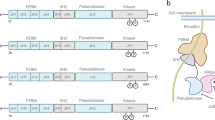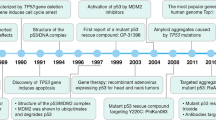Abstract
DEAD box RNA helicase p68 acts as a transcriptional coactivator of several oncogenic transcription factors apart from being a vital player of RNA metabolism. Signal transducer and activator of transcription 3 (Stat3) is a major oncogenic contributor of diverse cancers, including that of colon. Deciphering the mechanistic insights of coactivation of Stat3 transcriptional activity may aid in improved therapeutic strategies. Here we report for the first time a novel mechanism of alliance between p68 and Stat3 in stimulating transcriptional activity of Stat3. Interestingly, we observed that the expression of p68 and Stat3 bears strong positive correlation and significant colocalization in normal and colon carcinoma patient samples. We demonstrated that p68 directly interacts with Stat3 in HEK293 cells as well as multiple colon cancer cell lines. Additionally, p68 positively modulated both mRNA and protein expression levels of Stat3 target genes; promoter activity of Stat3 target gene Mcl-1 in multiple colon cancer cell lines. Also, p68 occupied the promoters of multiple Stat3 target genes in enhancing Stat3-dependent transcription. Moreover, the strong positive correlation between the abundance of p68 and Stat3 target genes in the same set of colon carcinoma samples further supported our observations. Enhanced expression levels of Stat3 target genes observed in primary tumors and metastatic lung nodules, generated in mice colorectal allograft model using syngeneic cells stably expressing p68, further reinforced our in vitro findings. Hence, this study unravels novel modes of p68-mediated oncogenesis through coactivation of Stat3 and enhancing Stat3 signaling.
This is a preview of subscription content, access via your institution
Access options
Subscribe to this journal
Receive 50 print issues and online access
$259.00 per year
only $5.18 per issue
Buy this article
- Purchase on Springer Link
- Instant access to full article PDF
Prices may be subject to local taxes which are calculated during checkout








Similar content being viewed by others
References
Janknecht R . Multi-talented DEAD-box proteins and potential tumor promoters: p68 RNA helicase (DDX5) and its paralog, p72 RNA helicase (DDX17). Am J Transl Res 2010; 2: 223–234.
Fuller-Pace FV, Moore HC . RNA helicases p68 and p72: multifunctional proteins with important implications for cancer development. Future Oncol 2011; 7: 239–251.
Dai T-Y, Cao L, Yang Z-C, Li Y-S, Tan L, Ran X-Z et al. P68 RNA helicase as a molecular target for cancer therapy. J Exp Clin Cancer Res 2014; 33: 64.
Sarkar M, Ghosh MK . DEAD box RNA helicases: crucial regulators of gene expression and oncogenesis. Front Biosci Landmark Ed 2016; 21: 225–250.
Yu H, Lee H, Herrmann A, Buettner R, Jove R . Revisiting STAT3 signalling in cancer: new and unexpected biological functions. Nat Rev Cancer 2014; 14: 736–746.
Kamran MZ, Patil P, Gude RP . Role of STAT3 in cancer metastasis and translational advances. BioMed Res Int 2013; 2013: e421821.
Carpenter RL, Lo H-W . STAT3 target genes relevant to human cancers. Cancers 2014; 6: 897–925.
Sun Y-M . The IL-6/JAK/STAT3 pathway: potential therapeutic strategies in treating colorectal cancer (Review). Int J Oncol 2014; 44: 1032–1040.
Henderson-Jackson EB, Helm J, Ghayouri M, Hakam A, Nasir A, Leon M et al. Correlation between Mcl-1 and pAKT protein expression in colorectal cancer. Int J Clin Exp Pathol 2010; 3: 768–774.
Lee W-S, Park Y-L, Kim N, Oh H-H, Son D-J, Kim M-Y et al. Myeloid cell leukemia-1 is associated with tumor progression by inhibiting apoptosis and enhancing angiogenesis in colorectal cancer. Am J Cancer Res 2014; 5: 101–113.
Zhang Y-L, Pang L-Q, Wu Y, Wang X-Y, Wang C-Q, Fan Y . Significance of Bcl-xL in human colon carcinoma. World J Gastroenterol WJG 2008; 14: 3069–3073.
Jin-Song Y, Zhao-Xia W, Cheng-Yu L, Xiao-Di L, Ming S, Yuan-Yuan G et al. Prognostic significance of Bcl-xL gene expression in human colorectal cancer. Acta Histochem 2011; 113: 810–814.
Cao D, Hou M, Guan Y, Jiang M, Yang Y, Gou H . Expression of HIF-1alpha and VEGF in colorectal cancer: association with clinical outcomes and prognostic implications. BMC Cancer 2009; 9: 432.
Bendardaf R, Buhmeida A, Hilska M, Laato M, Syrjänen S, Syrjänen K et al. VEGF-1 expression in colorectal cancer is associated with disease localization, stage, and long-term disease-specific survival. Anticancer Res 2008; 28: 3865–3870.
Langers AMJ, Verspaget HW, Hawinkels LJAC, Kubben FJGM, van Duijn W, van der Reijden JJ et al. MMP-2 and MMP-9 in normal mucosa are independently associated with outcome of colorectal cancer patients. Br J Cancer 2012; 106: 1495–1498.
Said AH, Raufman J-P, Xie G . The role of matrix metalloproteinases in colorectal cancer. Cancers 2014; 6: 366–375.
Iwamoto M, Ahnen DJ, Franklin WA, Maltzman TH . Expression of β-catenin and full-length APC protein in normal and neoplastic colonic tissues. Carcinogenesis 2000; 21: 1935–1940.
Shin S, Rossow KL, Grande JP, Janknecht R . Involvement of RNA helicases p68 and p72 in colon cancer. Cancer Res 2007; 67: 7572–7578.
Sarkar M, Khare V, Guturi KKN, Das N, Ghosh MK . The DEAD box protein p68: a crucial regulator of AKT/FOXO3a signaling axis in oncogenesis. Oncogene 2015; 34: 5843–5856.
Lassmann S, Schuster I, Walch A, Göbel H, Jütting U, Makowiec F et al. STAT3 mRNA and protein expression in colorectal cancer: effects on STAT3-inducible targets linked to cell survival and proliferation. J Clin Pathol 2007; 60: 173–179.
Gordziel C, Bratsch J, Moriggl R, Knösel T, Friedrich K . Both STAT1 and STAT3 are favourable prognostic determinants in colorectal carcinoma. Br J Cancer 2013; 109: 138–146.
Akgul C, Turner PC, White MR, Edwards SW . Functional analysis of the human MCL-1 gene. Cell Mol Life Sci CMLS 2000; 57: 684–691.
Isomoto H, Kobayashi S, Werneburg NW, Bronk SF, Guicciardi ME, Frank DA et al. Interleukin 6 upregulates myeloid cell leukemia-1 expression through a STAT3 pathway in cholangiocarcinoma cells. Hepatology 2005; 42: 1329–1338.
Sagawa M, Nakazato T, Uchida H, Ikeda Y, Kizaki M . Cantharidin induces apoptosis of human multiple myeloma cells via inhibition of the JAK/STAT pathway. Cancer Sci 2008; 99: 1820–1826.
Catlett-Falcone R, Landowski TH, Oshiro MM, Turkson J, Levitzki A, Savino R et al. Constitutive activation of Stat3 signaling confers resistance to apoptosis in human U266 myeloma cells. Immunity 1999; 10: 105–115.
Niu G, Wright KL, Huang M, Song L, Haura E, Turkson J et al. Constitutive Stat3 activity up-regulates VEGF expression and tumor angiogenesis. Oncogene 2002; 21: 2000–2008.
Leslie K, Lang C, Devgan G, Azare J, Berishaj M, Gerald W et al. Cyclin D1 is transcriptionally regulated by and required for transformation by activated signal transducer and activator of transcription 3. Cancer Res 2006; 66: 2544–2552.
Xie T, Wei D, Liu M, Gao AC, Ali-Osman F, Sawaya R et al. Stat3 activation regulates the expression of matrix metalloproteinase-2 and tumor invasion and metastasis. Oncogene 2004; 23: 3550–3560.
Dechow TN, Pedranzini L, Leitch A, Leslie K, Gerald WL, Linkov I et al. Requirement of matrix metalloproteinase-9 for the transformation of human mammary epithelial cells by Stat3-C. Proc Natl Acad Sci USA 2004; 101: 10602–10607.
Song Y, Qian L, Song S, Chen L, Zhang Y, Yuan G et al. Fra-1 and Stat3 synergistically regulate activation of human MMP-9 gene. Mol Immunol 2008; 45: 137–143.
Tetsu O, McCormick F . Beta-catenin regulates expression of cyclin D1 in colon carcinoma cells. Nature 1999; 398: 422–426.
Siddiquee KAZ, Turkson J . STAT3 as a target for inducing apoptosis in solid and hematological tumors. Cell Res 2008; 18: 254–267.
Yue P, Turkson J . Targeting STAT3 in cancer: how successful are we? Expert Opin Investig Drugs 2009; 18: 45–56.
Thakur R, Mishra DP . Pharmacological modulation of beta-catenin and its applications in cancer therapy. J Cell Mol Med 2013; 17: 449–456.
Bhattacharya S, Ghosh MK . HAUSP regulates c-MYC expression via de-ubiquitination of TRRAP. Cell Oncol 2015; 38: 265–277.
Ghosh MK, Sharma P, Harbor PC, Rahaman SO, Haque SJ . PI3K-AKT pathway negatively controls EGFR-dependent DNA-binding activity of Stat3 in glioblastoma multiforme cells. Oncogene 2005; 24: 7290–7300.
Ahmed SF, Das N, Sarkar M, Chatterjee U, Chatterjee S, Ghosh MK . Exosome-mediated delivery of the intrinsic c-terminus domain of PTEN protects it from proteasomal degradation and ablates tumorigenesis. Mol Ther J Am Soc Gene Ther 2015; 23: 255–269.
Chatterjee A, Chatterjee U, Ghosh MK . Activation of protein kinase CK2 attenuates FOXO3a functioning in a PML-dependent manner: implications in human prostate cancer. Cell Death Dis 2013; 4: e543.
Bhattacharya S, Ghosh MK . HAUSP, a novel deubiquitinase for Rb - MDM2 the critical regulator. FEBS J 2014; 281: 3061–3078.
Mandal T, Bhowmik A, Chatterjee A, Chatterjee U, Chatterjee S, Ghosh MK . Reduced phosphorylation of Stat3 at Ser-727 mediated by casein kinase 2—Protein phosphatase 2A enhances Stat3 Tyr-705 induced tumorigenic potential of glioma cells. Cell Signal 2014; 26: 1725–1734.
Cai B-H, Hsu P-C, Hsin I-L, Chao C-F, Lu M-H, Lin H-C et al. p53 acts as a co-repressor to regulate keratin 14 expression during epidermal cell differentiation. PLoS One 2012; 7: e41742.
Guturi KK, Sarkar M, Bhowmik A, Das N, Ghosh MK . DEAD-box protein p68 is regulated by β-catenin/transcription factor 4 to maintain a positive feedback loop in control of breast cancer progression. Breast Cancer Res 2014; 16: 496.
Sha J, Ghosh MK, Zhang K, Harter ML . E1A interacts with two opposing transcriptional pathways to induce quiescent cells into S phase. J Virol 2010; 84: 4050–4059.
Acknowledgements
We thank Dr Frances V Fuller-Pace and Dr Kenneth M Yamada for gifting the pGS5-p68 construct and pGZ21dx vector, respectively. We also thank Dr Uttara Chatterjee (Park Clinic, India) for providing human normal colon and colon carcinoma samples, related pathological reports and helping in the data analysis. This work is supported by grants from CSIR, India (EMPOWER-OLP-002, MEDCHEM-BSC0108 and CSIR-MAYO Clinic programme: MLP-0017) and DST Nano Mission programme (SR/NM/NS-1058/2015) to Dr Mrinal K Ghosh.
Author information
Authors and Affiliations
Corresponding author
Ethics declarations
Competing interests
The authors declare no conflict of interest.
Additional information
Supplementary Information accompanies this paper on the Oncogene website
Rights and permissions
About this article
Cite this article
Sarkar, M., Khare, V. & Ghosh, M. The DEAD box protein p68: a novel coactivator of Stat3 in mediating oncogenesis. Oncogene 36, 3080–3093 (2017). https://doi.org/10.1038/onc.2016.449
Received:
Revised:
Accepted:
Published:
Issue Date:
DOI: https://doi.org/10.1038/onc.2016.449
This article is cited by
-
USP7 targets XIAP for cancer progression: Establishment of a p53-independent therapeutic avenue for glioma
Oncogene (2022)
-
Promyelocytic Leukemia (PML) gene regulation: implication towards curbing oncogenesis
Cell Death & Disease (2019)
-
Inhibition of JAK2/STAT3 signaling pathway protects mice from the DDP-induced acute kidney injury in lung cancer
Inflammation Research (2019)
-
Long non-coding RNA MIAT promotes gastric cancer growth and metastasis through regulation of miR-141/DDX5 pathway
Journal of Experimental & Clinical Cancer Research (2018)



